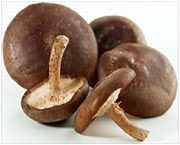One of the longest nerves in the body is known as the vagus nerve (VN). The VN is the 10th pair of cranial nerves that originates at the brain stem in the medulla oblongata. This nerve is part of the parasympathetic nervous system, which is a part of the ANS. Research suggests ear acupuncture can activate the VN.
Herbs & Botanicals
Shiitake (hua gu)
What is shiitake?
Shiitake (also known as hua gu) is a type of wild mushroom native to Japan, China and other areas in Asia. The mushrooms are small, grayish-brown and usually grow on the trunks of dead trees. Shiitake mushrooms have been a staple of Japanese and Chinese cuisine for millennia and are now one of the most popular types of mushrooms consumed in the U.S.
Why do we need shiitake? What is it used for?
 Shiitake mushrooms contain about twice as much protein as most
vegetables and are a good source of fiber. They are a good source
of complex carbohydrates called polysaccharides, which are believed
to boost the immune system. Shiitake mushrooms also contain iron,
minerals, and vitamins B1 and B2, with relatively high amounts of
niacin and riboflavin.
Shiitake mushrooms contain about twice as much protein as most
vegetables and are a good source of fiber. They are a good source
of complex carbohydrates called polysaccharides, which are believed
to boost the immune system. Shiitake mushrooms also contain iron,
minerals, and vitamins B1 and B2, with relatively high amounts of
niacin and riboflavin.
How much shiitake should I take?
Traditionally, the intake of dried shiitake mushrooms (either in soups or as a decoction) is between 6-16 grams per day. For shiitake tinctures, 2-4 milliliters per day is recommended.
What forms of shiitake are available?
Shiitake mushrooms are most readily available in the fresh or dried variety and can be found at most grocery stores. It is also available in tincture form, and a powdered extract known as LEM (lentinus edodes mycelium) is available at many nutritional stores.
What can happen if I take too much shiitake? Are there any interactions I should be aware of? What precautions should I take?
While shiitake has an excellent safety record, it has been known to induce temporary diarrhea and abdominal bloating when consumed in high amounts (>20 grams per day). Women who are pregnant or nursing should consult with their health professional before consuming shiitake.
References
- Hobbs C. Medicinal Mushrooms. Santa Cruz, CA: Botanica Press, 1995, pp. 125-8.
- Jones K. Shiitake: a major medicinal mushroom. Alt Compl Ther 1998;4:53-9.
- Jones K. Shiitake: The Healing Mushroom. Rochester, VT: Healing Arts Press, 1995.
- Lin Y, et al. A double-blind treatment of 72 cases of chronic hepatitis with lentinan injection. News Drugs and Clin Remedies 1987;6:362-3.
- Taguchi I. Clinical efficacy on lentanin on patients with stomach cancer. End point results of a four-year followup survey. Cancer Detect Prevent Suppl 1987;1:333-49.


